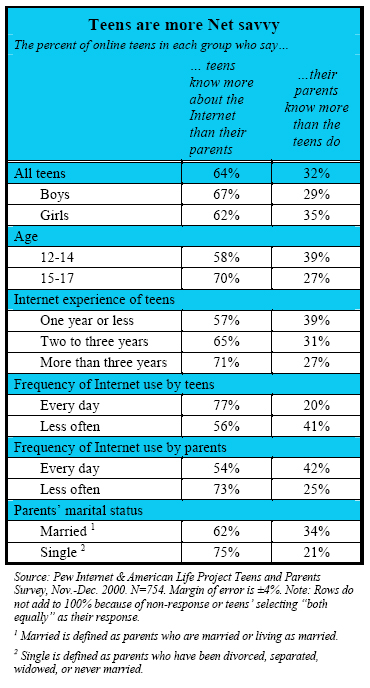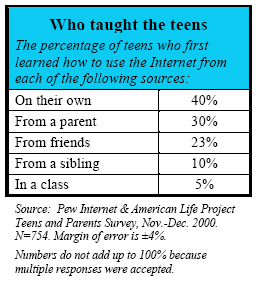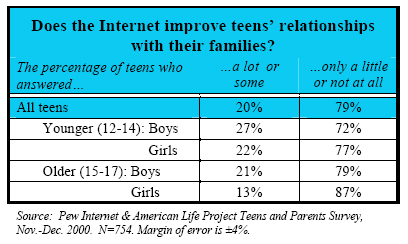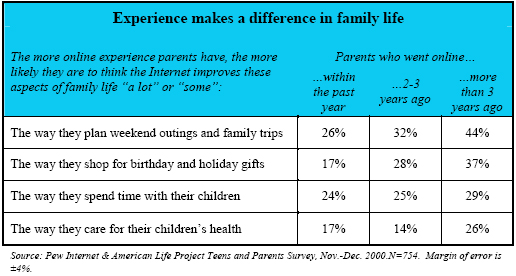Introduction
In a December 2000 survey of 754 parents and an equal number of children in their homes between the ages of 12 and 17, we found that Internet use is changing some of the ways teens interact with their friends. We also saw that the Internet is introducing new dynamics into family life. In their overall judgment, parents think that the Internet’s role in their children’s lives is beneficial. More than half of parents of online youth (55%) believe the Net is generally a good thing for their children and only 6% believe it is bad for their children. Some 38% do not think it has had an effect on their child one way or the other.
Parents do have concerns about the amount of time that their children spend online and about the people and material they will encounter in cyberspace. These worries prompt many parents to impose rules on Internet use, to monitor their children’s online activities, and to install software to prevent their children from accessing objectionable material.
In a quarter of families who have Internet access, a child has mastered a technology before the parents. In fact, teens often take the lead in getting the family online and teaching their parents how to use the Internet.

Teens Know the Net Better Than Their Parents
Nearly two-thirds of youth and parents agree that the children know more about the Internet than their parents do. More online boys than girls say that they know the Internet better than their parents. Similarly, older teens are more likely than younger teens to say their knowledge surpasses their parents. This view is also especially prevalent among online teens from families with modest incomes and those who live in single-parent homes.
The more recently a parent has gone online, the more likely it is that the teenager believes he knows more about the Internet than his parents. Fully 70% of online teens whose parents went online in the last year say they know more, compared to 53% of online teens whose parents have been online for more than three years.
When it comes to parents, more online fathers than mothers say they know more about the Internet than their children; more college-educated parents say this than those without college degrees.
How Parents and Youth Learn about the Net
Forty percent of online teens report teaching themselves how to use email and the Internet. And they are not just teaching themselves – often, they often go on to teach their families. “At the time this was all beginning, no one else in our household beside myself knew how to do anything on any computer,” reported a 17-year-old boy in an online discussion group we conducted in 2001. “I had to write out instructions and tape them to sides of the monitor so that they’d know how to turn the computer on.” Another 30% of teens report learning it from their parents. Only 5% learned from a class. “I learned the basics of the Internet (browsing, searching, E-Mail) at a summer course at school, but I taught myself the rest (downloading programs, instant messaging, etc.),” said a girl, 15, in the online discussion group.
Teens with the most knowledgeable parents (those who have been online longer than 3 years) were the most likely to be taught by their parents (43%). Those teens whose parents don’t go online mainly learned how to use the Internet from friends (33%) or by teaching themselves (39%). Girls are more likely to have learned from their parents than boys, and boys are more likely to report being self-taught. A shift back to more traditional parent-child roles may be occurring, though, because a plurality of younger teens, regardless of gender, reported learning to use the Internet from their parents. Among 12- to 14-year-olds, 41% were taught by parents, compared to 22% of older teens who said they were taught by their parents. More than half (51%) of teens 15 to 17 report learning to use the Internet on their own.

Some of the differences between how teens of different ages learned to use the Internet can be explained by the pattern of Internet adoption in the U.S. About three years ago, Americans, both adults and teens started going online in droves.
Often older teens with more interest and leisure time mastered the new technology and taught it to friends and family. Youth who are aged 12 through 14 are more likely to have parents who went online before they did. Many of these parents had Internet access at work or school, and thus were already familiar enough with the technology, even if they did not have it at home, to teach their children how to use it.
Teens say they go online for the first time for a variety of reasons. “My dad got the Internet at home because he wanted us all to ‘get with the times’ so to speak,” said one 16-year-old boy in our online discussion group. Other parents decide to go online because they felt it was vital to the education of the children in the family. “I got it because I needed it for school and because it keeps me out of trouble,” wrote a 17-year-old girl. And some families got the Internet because the children really wanted it. “My dad decided to get the net because I begged and begged him for it,” said a 14-year-old girl also in the online discussion group.
The Internet’s Impact on Relationships with Friends and Family
The conflicts surrounding time use as well as content accessed on Internet-connected computers may be part of the reason why teens do not think the Internet is helping their relationships with their families. In fact, most teens (61%) do not think that the Internet helps their relationships with their families at all. Almost two-thirds of online teens (64%) express a generalized concern that young people’s use of the Internet takes away time they would spend with their families. Some 69% of girls say that and 59% of boys agree.

When asked whether the Internet has improved how they spend time with their children, 79% of parents say it has not helped at all or has only helped a “little bit.” The frequency with which both parent and child go online is closely associated with the level of improvement they report. Parents who go online every day and parents of children who go online daily both report a greater sense of improvement in how they spend time with their children.
Parents and their children are evenly split on the question of whether the Net improves their children’s relationships with their friends. Almost half of each generation (48%) believe Internet use is tied to improved friendships. “When I did not have any classes with my best friend the other year, we emailed each other every day and told each other the details of our day,” said a 17-year-old girl in the online discussion group. “That brought us much closer together. That was when our friendship became stronger.” The teens who are the most active Internet users are the most likely to express these positive feelings. In addition, fathers are more likely to report positive feelings than mothers, and the parents who use the Internet the most are the most enthusiastic about the beneficial impact of the Internet on their children’s relationship with friends.
The Internet’s Impact on Family Activities
In most online homes, parents do not think the Internet has affected intrafamily relations much. Still, some believe that the Internet has contributed at least somewhat to enjoyable family activities. More than a third (34%) of parents say the Internet has helped them plan weekend outings; 27% say it has helped them shop for birthday and holiday gifts for family members; 26% say it has improved the way they spend time with their children; and 19% say it has improved the way they care for their children’s health.
There are sharp differences in the views held by online veterans compared to newbies on all these issues. The longer a parent has been online, the more likely it is for that parent to have quite positive things to say about the impact of the Internet on family life.

In our parents and teens survey in December 2000 we also saw that that 28% of online parents use email to communicate with their children’s teachers and 20% of parents email the parents of their children’s friends. In addition, our holiday season survey in 2001 found that 27% of parents with Internet access look for celebration-related material for the holidays, such as crafts and recipes. Some 21% of non-parents say they had done this.


